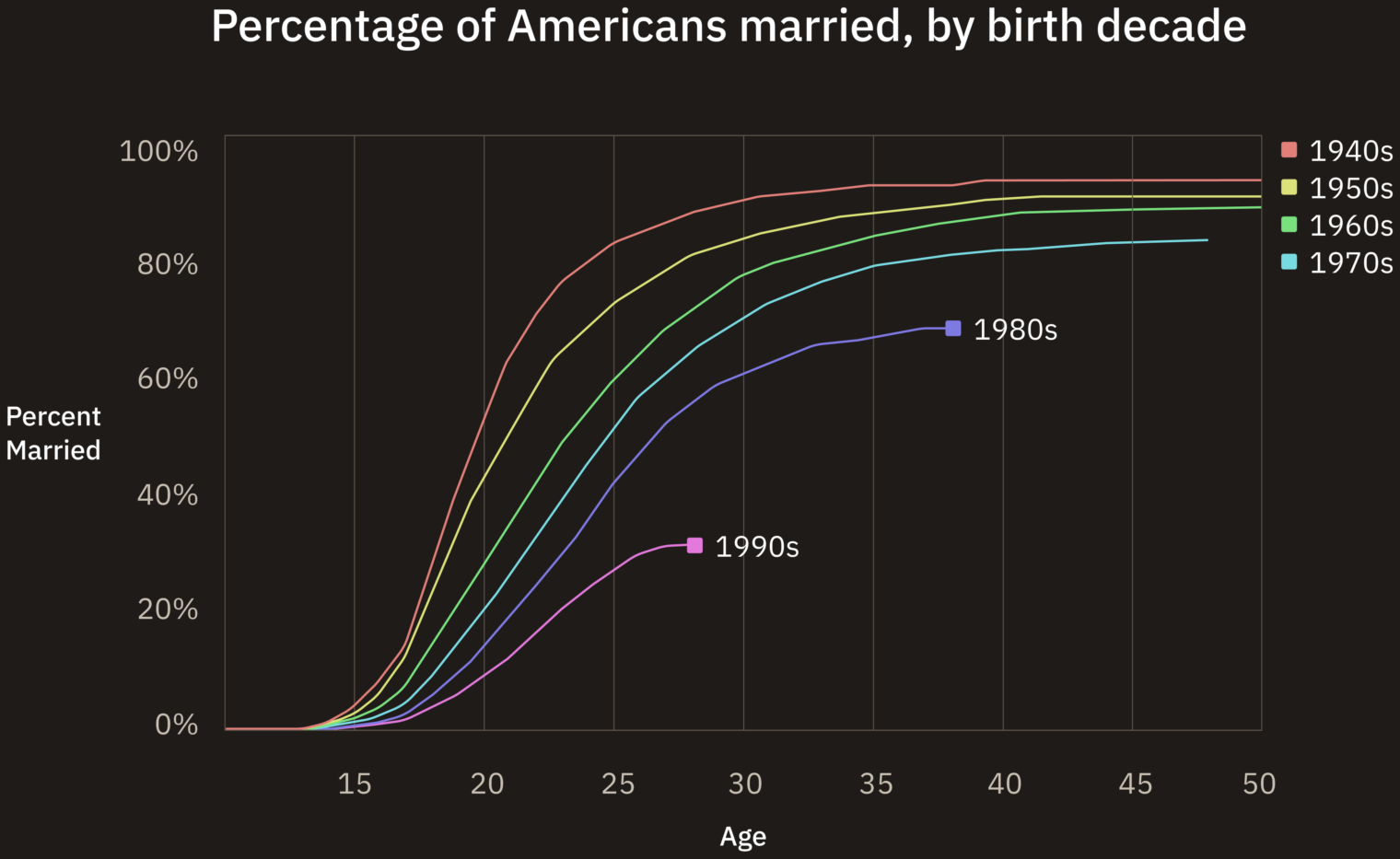“A Wife’s Revenge from Beyond the Grave” (The Free Press) is worth reading for the window that it provides into modern American marriage.
We consider ourselves smarter and more evolved than people in the past, but the story starts with a successful 33-year-old man deciding to reject 10,000+ years of human convention and marry a woman old enough to be a grandmother:
Catherine Youssef met Allan Kassenoff in New York City in 2005. He was an upstart, 33-year-old patent litigator; she was an associate at his law firm, four years his senior, and had already served as an assistant U.S. attorney for the Eastern District of New York.
She would start trying to have her first child, in other words, in her late 30s.
After they got married, Catherine wanted kids “ASAP,” Allan told me; she wanted to do IVF straight away, he said, before they’d even started trying naturally. He wanted to have kids, but he also wanted to at least try to get pregnant without medical intervention, given the expense of IVF—but Allan caved, he said, because Catherine, who was nearing 40, was so adamant. Allan says they underwent several rounds of IVF, estimating that in total the couple spent upward of $200,000 on fertility treatments.
Then, less than two years into their marriage, Catherine was diagnosed with a rare and aggressive form of breast cancer and received treatment. According to her therapy records, which Catherine shared with her suicide note, she later told a therapist that Allan “showed that he was not good at handling stress” during this time.
While she recovered, the Kassenoffs decided to adopt. They contacted an adoption attorney, who matched them with a woman in Florida who was pregnant but unable to look after a baby; in July 2009, the Kassenoffs became parents to Ally, who was delivered to them straight from the hospital where she was born.
Soon thereafter, Allan says Catherine wanted to try IVF again—and threatened to do it “with or without me.”
He went along with it, but told me he was “nervous, because of how bad our relationship was.” He didn’t think bringing another child into the family was “the best thing in the world.”
This time, the IVF worked: less than a year after she adopted Ally, Catherine got pregnant. The Kassenoffs’ second daughter, Charley, was born in February 2011—and was quickly followed by a third, JoJo, in August 2013.
So… adoption throughout human history was mostly done in the context of strong family bonds, right? A man might adopt a nephew or niece or the children of a widow whom he married. Getting hold of a baby from a stranger 1,000 miles away is a new idea, I think. Obviously, IVF is also a relatively new idea.
I don’t want to spoil the article, but the mom in this story turns out to be unethical and takes tremendous risks. What job does she get?
But by March 2015 she was employed again, working for Governor Andrew Cuomo as a Special Counsel for Ethics, Risk, and Compliance.
The au pair turns out to have the clearest perspective on the situation:
Celine Dublanchet, who became the Kassenoffs’ au pair in October 2016, also made disturbing allegations about Catherine. According to court documents, Dublanchet said Catherine once locked Ally [the adopted child], then 7, in the basement by herself for two hours as a punishment, and on another occasion made Ally go outside alone after dark to “clean the garden” in the middle of winter.
Dublanchet claimed that Ally slept on a mattress on the floor in her room, while the other two children [the genetic offspring] slept in Catherine’s bed every night. Every morning, she told me, Ally had to make her mother’s bed.
“Ally was Cinderella,” Dublanchet later wrote to the court, “her two sisters Anastasia and Drizella, and Catherine the horrible stepmother.”
The wife seems to be aware of “The Domestic Violence Parallel Track” in family court:
After a trip to the hospital on May 11, 2019, Catherine texted a friend: “If I had a mark or a bruise or something, it would be easy.”
“You don’t need a bruise to divorce him,” the friend texted back.
“Just to get full custody,” Catherine replied.
On May 15, 2019—mere days after Catherine sent the text that began, “If I had a mark or a bruise”—Allan says his eldest daughter went to school and told her teachers that her dad had kicked her a couple of days earlier. The school immediately launched a Child Protective Services investigation.
The next morning, Saturday, May 18, Allan woke to an email from Catherine’s friend Wayne Baker, informing him that she had obtained an order of protection, barring Allan from contacting her or the kids. Allan says he believes the entire story about “the kick” was fabricated by Catherine, and she told Ally exactly what to say to school officials—all so that she could get custody of the kids.
When I asked Ally—now almost 15—about it, she supported Allan’s version of events, saying her dad had not kicked her; what she’d said to the school wasn’t true. “My mom told me to, like, always say bad stuff about my dad,” she told me.
The article provides a window into what it costs to settle the question of who gets the cash-yielding children in a U.S. family court (in a European country, the cost is often minimal because the law specifies a custody arrangement that is difficult to deviate from and child support profits are capped so there isn’t a huge financial incentive to get hold of the kids).
The judge also appointed psychologist Marc Abrams—who had worked in the Westchester County courts system for over two decades—to offer a neutral assessment of the parents and recommend a custody agreement. Though the report is confidential, Abrams revealed during a July 2020 temporary custody trial that he recommended Allan have sole custody of the kids—and that he believed Catherine had an “unspecified personality disorder.”
Catherine, along with two other women, filed complaints against Marc Abrams, the psychologist who recommended Allan have custody, alleging professional misconduct and inappropriate behavior toward women. Abrams denies these allegations, calling them and any others “defamatory.” After an investigation, the panel of court-approved mental health professionals removed him, meaning he could no longer provide court evaluations—a lucrative gig, with each case paying around $50,000.
That’s just for the psychologist. What about the divorce litigators? The article just says “after millions of dollars, and over 3,000 court filings, the divorce still hadn’t been finalized.” (The decision to get married also cost the man his $1 million/year job and career.)
For the full story, which has quite a few additional twists, read “A Wife’s Revenge from Beyond the Grave”.
Full post, including comments 











